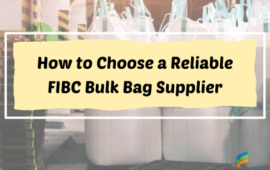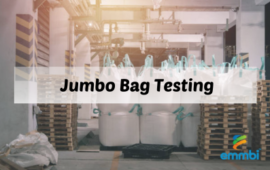Polypropylene was discovered in 1954 by the Italian chemist Giulio Natta.
His discovery transformed the packaging industry.
Polypropylene fabric is one of the lightest synthetic fabrics, offering superior qualities. It is resistant to abrasion, insects, pests, along with being resistant to moisture and chemicals.
The fabric has proved to be a lightweight yet sturdy material weaved into a highly potent bulk container. Before delving into the uses of FIBC bulk bags, let’s first discuss what they are and how they are made.
Flexible Intermediate Bulk Container (FIBC) bulk bags, also known as super sacks, are industrial containers. Made from an ultra-lightweight material and super sturdy polypropylene, these bags store and transport large quantities of dry and flowable products. Following are the four essential uses of polypropylene woven bags:
Storing & Transporting Agricultural Products
Bulk Bags has proved to be a game-changer in agricultural packaging. Bulk bags have been extremely useful in storing agricultural products like grains, pulses, animal feed, fertilizers, et al. One-tonne polypropylene bulk bag have become an essential tool in keeping fruits and transporting fruits like pomegranates, apples, mangoes, guavas, et al. Apart from crops and fertilizers, bulk bags also act as adequate storage for seeds. The high-quality, sturdiness, easy availability, and flexible shapes and sizes have made bulk bags a practical and essential component of storage and transportation in the agriculture sector.
Essential Tool in Construction Projects
PP bulk bags have multiple uses in building & construction. First, bulk bags store and transport construction materials like Brick paver blocks, cement, and concrete. Secondly, since the FIBC super sacks are strong and sturdy, they ensure the safety of the workers while loading and transporting materials like stones, gravels, soil, debris, and other such elements, which can otherwise cause damage and injuries to the workers. The jumbo bags are also used to perform essential construction procedures like filtering, isolating, and draining materials, making them preferred in geotechnical projects.
Storing, Transporting, and Disposing of Chemical Substance
Chemical-based industries like pharmaceuticals require storage of chemical substances for a long time. PP bulk bags are the first choice, as these polypropylene containers are highly durable, lightweight, and easy to procure. The same goes for transporting these chemical substances to long distances. However, the even more important use is storing and transporting hazardous chemicals and organic minerals for disposal. Bulk bags produced in compliance with safety regulations are highly effective in storing such chemicals, especially powdered ones.
Curbing Damages Due to Floods
Of all the uses, probably the most life-saving application of polypropylene is for curbing damages due to floods. This was evident during the 2011 Thailand floods, where huge sandbags were used instead of the traditional smaller bags, which offered better resistance. In North America, PP bulk bags, also known as flood control bags, build resistance walls as tall as four feet, forming formidable barriers. This also shows how durable and sturdy polypropylene bags are, and that, coupled with their lightweight, makes the perfect combination for storage and transportation.



